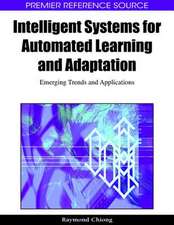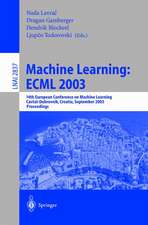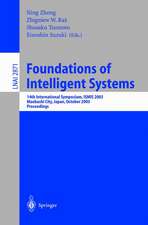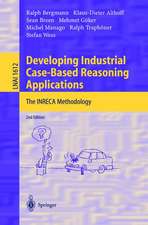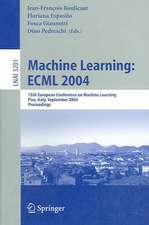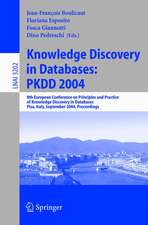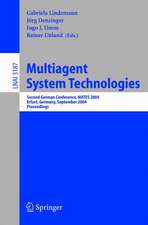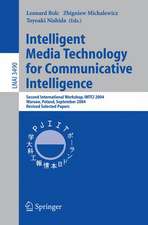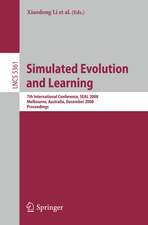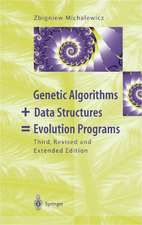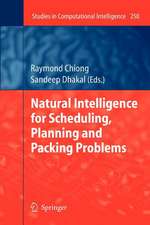Variants of Evolutionary Algorithms for Real-World Applications: Real-World Algorithms
Editat de Raymond Chiong, Thomas Weise, Zbigniew Michalewiczen Limba Engleză Paperback – 26 ian 2014
| Toate formatele și edițiile | Preț | Express |
|---|---|---|
| Paperback (1) | 654.55 lei 6-8 săpt. | |
| Springer Berlin, Heidelberg – 26 ian 2014 | 654.55 lei 6-8 săpt. | |
| Hardback (1) | 658.33 lei 6-8 săpt. | |
| Springer Berlin, Heidelberg – 5 noi 2011 | 658.33 lei 6-8 săpt. |
Preț: 654.55 lei
Preț vechi: 818.18 lei
-20% Nou
125.26€ • 136.02$ • 105.22£
Carte tipărită la comandă
Livrare economică 22 aprilie-06 mai
Specificații
ISBN-10: 3642440584
Pagini: 480
Ilustrații: XIV, 466 p.
Dimensiuni: 155 x 235 x 25 mm
Greutate: 0.67 kg
Ediția:2012
Editura: Springer Berlin, Heidelberg
Colecția Springer
Seria Real-World Algorithms
Locul publicării:Berlin, Heidelberg, Germany
Public țintă
ResearchCuprins
Section I: Introduction.- Section II: Planning & Scheduling.- Section III: Engineering.- Section IV: Data Collection, Retrieval & Mining.
Recenzii
“This handbook offers a comprehensive introduction to advanced ways to adapt EAs to complex real-world problems. These applications include production lines, scheduling, supply networks, engineering optimization, ship design, and soil properties. Considering the breadth of the applications and depth of the discussions, this compendium is a welcome addition to the EA literature.” (R. Goldberg, Computing Reviews, June, 2013)
Textul de pe ultima copertă
Evolutionary Algorithms (EAs) are population-based, stochastic search algorithms that mimic natural evolution. Due to their ability to find excellent solutions for conventionally hard and dynamic problems within acceptable time, EAs have attracted interest from many researchers and practitioners in recent years. This book “Variants of Evolutionary Algorithms for Real-World Applications” aims to promote the practitioner’s view on EAs by providing a comprehensive discussion of how EAs can be adapted to the requirements of various applications in the real-world domains. It comprises 14 chapters, including an introductory chapter re-visiting the fundamental question of what an EA is and other chapters addressing a range of real-world problems such as production process planning, inventory system and supply chain network optimisation, task-based jobs assignment, planning for CNC-based work piece construction, mechanical/ship design tasks that involve runtime-intense simulations, data mining for the prediction of soil properties, automated tissue classification for MRI images, and database query optimisation, among others. These chapters demonstrate how different types of problems can be successfully solved using variants of EAs and how the solution approaches are constructed, in a way that can be understood and reproduced with little prior knowledge on optimisation.
Caracteristici
Provides real-world applications of Evolutionary Algorithms
Written by leading experts in this field
Descriere
Evolutionary Algorithms (EAs) are population-based, stochastic search algorithms that mimic natural evolution. Due to their ability to find excellent solutions for conventionally hard and dynamic problems within acceptable time, EAs have attracted interest from many researchers and practitioners in recent years. This book “Variants of Evolutionary Algorithms for Real-World Applications” aims to promote the practitioner’s view on EAs by providing a comprehensive discussion of how EAs can be adapted to the requirements of various applications in the real-world domains. It comprises 14 chapters, including an introductory chapter re-visiting the fundamental question of what an EA is and other chapters addressing a range of real-world problems such as production process planning, inventory system and supply chain network optimisation, task-based jobs assignment, planning for CNC-based work piece construction, mechanical/ship design tasks that involve runtime-intense simulations, data mining for the prediction of soil properties, automated tissue classification for MRI images, and database query optimisation, among others. These chapters demonstrate how different types of problems can be successfully solved using variants of EAs and how the solution approaches are constructed, in a way that can be understood and reproduced with little prior knowledge on optimisation.


